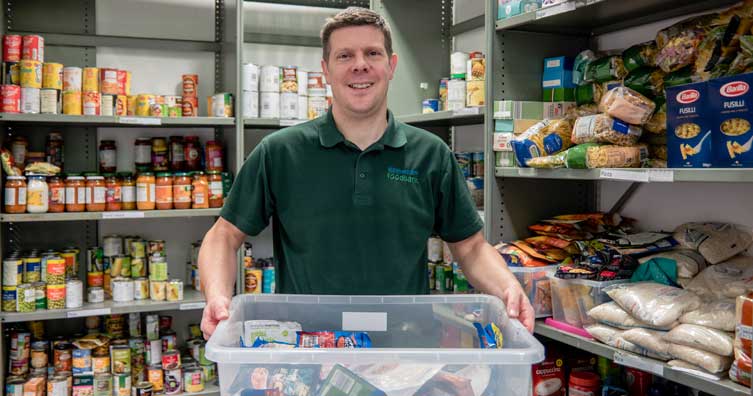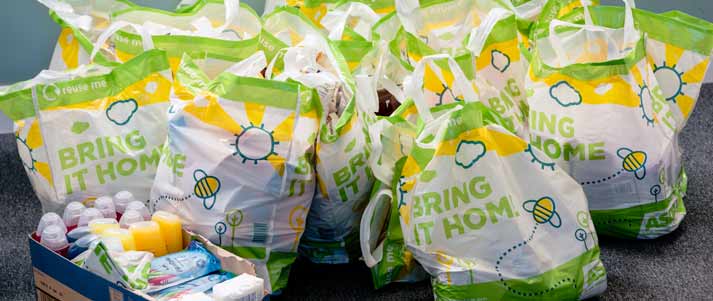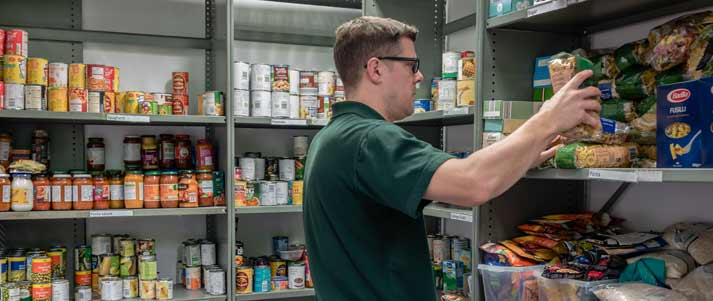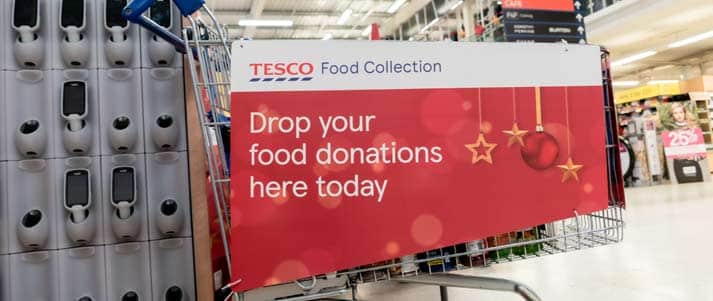Food banks – how to find and use their support
If you can't find the money to feed yourself, your local food bank could give you the supplies you need, plus extra support too.

Credit: HASPhotos – Shutterstock
In our latest National Student Money Survey, 9% of surveyed students said they had to use a food bank in the 2023/24 academic year.
While we'd all rather that food banks didn't need to exist, it's important to be aware of the help they can offer and how to access it.
Read on to find out who can use food banks, what you'll get in a food parcel, and the other services on offer too.
What's in this guide?
Who can use food banks
Fundamentally, food banks can be used by whoever needs them.
There are no restrictions or requirements regarding who can access the support offered by food banks. You don't need to be claiming Universal Credit or be unemployed. In fact, there have been countless troubling reports of nurses, teachers and other people in full-time employment having to use food banks.
A recent report by HEPI found that 27% of universities now have food banks. This just goes to show that if you're struggling to afford the rising price of your weekly shop, you're not alone. There are plenty of other students out there having to turn to food banks for help.
So, whatever your situation is, if you feel that you need to use a food bank, please don't feel guilty, embarrassed or ashamed for doing so. Financial hardship can hit anyone, especially during the cost of living crisis.
And don't worry about how you'll be treated when you're there. You should find that food banks are kind, welcoming and judgement-free zones. The staff are usually volunteers and they're there because they care. And, as we'll explain later, they can potentially offer you more than just a food parcel.
Getting a food bank referral
Although food banks are technically open to anyone, you may find that you need a referral to access many of them. This includes all of those run by the Trussell Trust, which operates around half of the food banks in the UK.
You can get a referral from a professional or organisation in a position of authority or care, including:
- A doctor
- Your university (speak to your SU for more info)
- A social worker
- The Jobcentre
- Citizens Advice.
As part of your referral, you'll be given a food voucher to take to the food bank.
This voucher will give the staff at the food bank some basic information about you, including why you need support and what guidance or additional help you may need.
Using a food bank without a referral
As we explained above, all Trussell Trust food banks require a referral.
But a recent report states there are at least 1,172 further independent food banks across the country that aren't run by the Trussell Trust. Some of those can be accessed without a referral.
There's no hard and fast way to find food banks that don't need a referral. There's also no guarantee that there'll be one near where you live.
However, some local councils publish lists of all the food banks in the area. If yours does, it's worth taking a look as they often specify whether each one requires a referral or not.
Below we'll also cover soup kitchens and other similar initiatives, most of which don't require a referral either.
What do you get in a food parcel?

Credit: HASPhotos – Shutterstock
Exactly what's in a food parcel will vary depending on the food bank you attend and what your specific requirements are.
But, generally speaking, the types of things in a food parcel are pretty consistent. You can expect dried, tinned and long-life food products, plus some essential non-food items too.
The Trussell Trust says that its food parcels will contain at least three days' worth of supplies. But again, you could get more or less depending on which food bank you attend and what your needs are.
The edible contents of a food parcel typically consist of:
- Pasta
- Tinned soup
- Cereal
- Baked beans
- Rice
- Tea and/or coffee
- Long-life milk
- Tinned meat and/or fish
- Tinned fruit and/or vegetables
- Pasta sauce
- Biscuits.
Meanwhile, the non-food items in a food parcel could include:
- Deodorant
- Washing up liquid
- Detergent
- Nappies
- Sanitary products.
Again, precisely what's in your food parcel will depend on what's available at the time, and if you have any specific needs. For example, if you have dietary requirements (like gluten-free, vegetarian or halal foods), the volunteers at the food bank should be able to tailor the parcel to your needs.
Similarly, if you have anyone depending on you for food, such as children, your parcel can be adjusted accordingly. This could mean giving you extra supplies, or more suitable foods.
Other services offered by food banks
Food banks don't just offer food and other essential supplies.
Ultimately, food banks aim to break the cycle of people needing their services. To help achieve this, your local food bank could offer some or all of the following:
- Debt advice and guidance on how to budget
- Mental health support
- Information on claiming Universal Credit and other benefits you may be entitled to.
If you don't need any of this extra support and just want somebody to talk to, food bank volunteers are happy to do this too. We've said it once and we'll say it again: food banks are warm, welcoming spaces and the staff will gladly have a chat with you.
How to find a food bank near you

Credit: HASPhotos – Shutterstock
There's no single resource that we can be sure lists every food bank in the UK.
However, there are a few online maps that do a good job of listing the vast majority of them:
- Give Food's map is probably the most definitive, featuring over 2,500 UK food banks (including Trussell Trust sites). Just note that this resource focuses on giving to food banks, so while it's great for locating those near you, you'll need to click through to each website for more details.
- The Trussell Trust's map features all of its 1,400+ UK locations.
- The Independent Food Aid Network's map locates all of the 550+ independent food banks that are members of its organisation.
We should stress that as around half of the food banks in the UK are independent, it's difficult to say for sure if even Give Food's map lists every single one.
If you can't find a local food bank on any of the maps we've featured, try Googling "food banks near me" or "food banks in [your area]", or looking on your council's website.
Organisations including Citizens Advice and your university should also be able to locate one nearby, as should anyone who formally refers you to a food bank.
Failing all of this, you could try contacting the types of locations that usually host food banks to see if they offer the service. Religious buildings like churches, temples and mosques often run food banks, as do community centres. Get in touch to see if and when they operate a food bank.
Community fridges
Community fridges are spaces where local communities can share food. This includes excess supplies from supermarkets, restaurants, households and gardens.
While they are very similar to food banks, community fridges differ slightly in that their main goal is to stop fresh food from going to waste. That said, they are still free to use and can be accessed by those in need.
What's more, as community fridges aim to reduce food waste, you'll often find fresher produce there, including fruit and vegetables. This is in contrast to food banks, where a parcel will often (but not always) include dried and tinned products.
There are over 600 community fridges in the UK, and the charity behind them, Hubbub, maps them all on its website.
Soup kitchens and more free meals
Although they're not quite the same thing as food banks, soup kitchens and other similar initiatives provide free hot meals to the community.
Contrary to what you may think, soup kitchens aren't just for the unhoused. They're also open to anyone who is hungry, lonely, vulnerable – basically, anyone who needs them. And, like food banks, soup kitchens are welcoming community spaces.
Despite the name, many soup kitchens serve more than just soup. 'Soup kitchen' is really just a general term used to describe any charitable organisation providing free hot meals to those in need.
Most soup kitchens are independent, but FoodCycle operates a network across the country and has a map displaying dozens of locations in the UK. Otherwise, your best bet is to Google "soup kitchen near me" or "soup kitchen in [your area]" and see what's nearby.
How to donate to a food bank

Credit: HASPhotos – Shutterstock
If you're privileged enough to be able to spare your money or time, there are a number of ways you can help.
The easiest and most obvious way is to donate food and essential supplies to your local food bank. There are a few ways to do this:
- Lots of supermarkets have collection boxes either by the checkouts or at the entrance
- Many food banks, including all Trussell Trust sites, allow you to drop food off directly
- Schools, churches and other community hubs often hold collections for food banks.
Food banks also rely on financial donations to continue paying their full-time staff, as well as acquiring, renting and maintaining the locations they use.
The Trussell Trust has a page on its website for making donations, both one-off and monthly. And if your local food bank isn't part of the Trussell Trust, you can contact them directly to see how they prefer to receive donations.
Finally, if you have the time, you could even volunteer at your local food bank. Again, the Trussell Trust lists volunteering opportunities on its website, and you can contact other food banks directly to find out how you can help.
If you're at university and struggling to get by, you may be able to access hardship funding.








